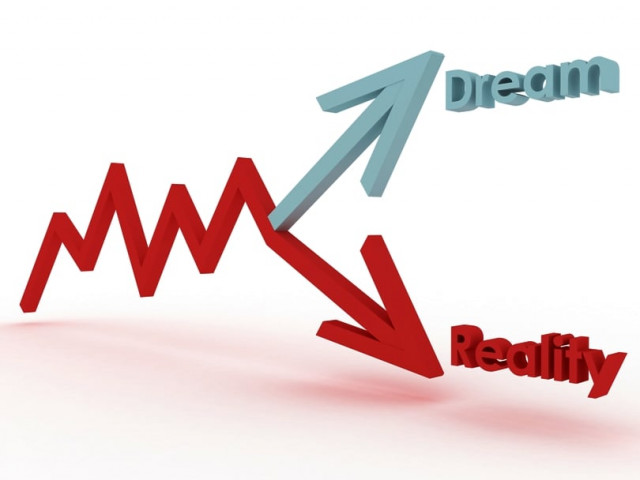Economy’s revival sacrificed for IMF deal: Pasha report
Ex-finance minister wants 10% regulatory duty slapped on non-essential imports.

As against the official economic growth target of 4.4%, the stabilisation package will result into a sluggish growth rate of 2.5%, which will hardly improve per capita income or in employment prospects. PHOTO: FILE
“The IMF programme targets agreed to by the Pakistani authorities clearly indicate that the process of revival of the economy has been sacrificed at the altar of macroeconomic stabilisation,” according to a report written by former Finance Minister, Dr Hafiz Pasha.
Dr Pasha in his study “Economy of Tomorrow: a case study of Pakistan” presented a detailed analysis of the IMF programme and its implications on the country’s economy and the people. “The PML-N government which was so deeply committed to economic revival has had to at least temporarily abandon this goal in the interest of securing the Fund programme”, he argued.
The study has been launched at the platform of Friedrich-Ebert-Stiftung –a German political foundation, which has initiated Economy of Tomorrow project for establishing a dialogue between Asia and Europe on a new development paradigm. As a first step the foundation is undertaking country-specific studies.
Under the $6.67 billion three-year programme, the IMF has forced tough conditions of reducing budget deficit by 2.2% of Gross Domestic Product this year, increase power tariffs and set very ambitious targets of building foreign currency reserves that will lead to rupee depreciation.
The author argued that as part of stabilisation, the IMF was seeking huge adjustment in the rupee value against the US dollar. The rupee is expected to depreciate sharply by almost 14% during the current fiscal year, falling to Rs113 per dollar by end June 2014, he added.
The IMF expects that the presence of the programme will attract foreign investors in hordes and encourage multilaterals to scale up their assistance to Pakistan. “Overall, the IMF programme, as it has come out, is unlikely to bolster much confidence in the markets, given the limited initial disbursements, quarterly reviews and very tough targets for a relatively small amount of funding”.
As against the official economic growth target of 4.4%, the stabilisation package will result into a sluggish growth rate of 2.5%, which will hardly improve per capita income or in employment prospects.
Pasha said in case of slippages on the fiscal side, there is the likelihood of mini-budgets during 2013-14 or a spate of waivers by the IMF Board.
He said it appeared that the government has agreed with the IMF that the combined federal and provincial development budgets will be cut by one-fourth to Rs840 billion from Rs1.140 trillion. “This is one of the reasons why the GDP growth rate will be low”.
Alternative Reforms
The author has advocated import compression strategy by levying additional regulatory duties on a range of non-essential imported items. Pasha argued that excluding essential imports, regulatory duty may be introduced at a rate of 10% to stop fast depletion of foreign exchange reserves.
On items that are governed through concessionary statutory regulatory orders Pasha has proposed 15% regulatory duty. He said this will curtail the annual import bill by $2.5 billion. He said these measures would generate Rs120 billion worth of additional taxes, helping to achieve this year’s Rs2.475 trillion tax target that otherwise sounds unrealistic.
Published in The Express Tribune, October 22nd, 2013.
Like Business on Facebook, follow @TribuneBiz on Twitter to stay informed and join in the conversation.



















COMMENTS
Comments are moderated and generally will be posted if they are on-topic and not abusive.
For more information, please see our Comments FAQ